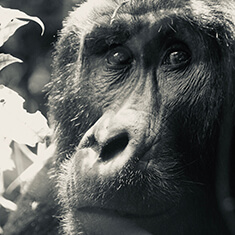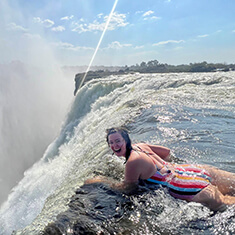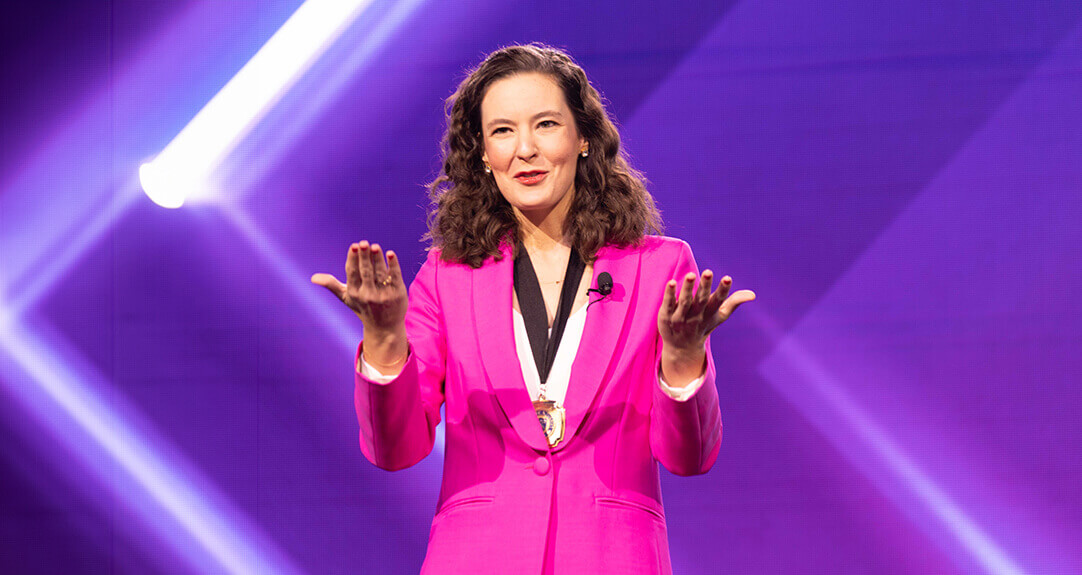Faith, Courage and Focus
A conversation with Amanda Hug, FSA, MAAA, MBA, on life’s journeys and actuarial leadership
February 2025Photo: Joseph Young/SOA
Amanda Hug, FSA, MAAA, MBA, has always known she wanted to be a leader. Part of that was the confidence that she has a sensible head on her shoulders, and because of that, she trusts herself and her judgment. Another part is being grounded in something deeper: her faith. I’m not a religious person, but even I can see that there is comfort and security in knowing that we are not braving it alone in any new situation.
Perhaps that belief in constant companionship fuels Hug’s sense of adventure. She has, after all, gone gorilla-trekking in Uganda and sandboarding in Qatar.
Hug, 36, recently became the youngest-ever Society of Actuaries (SOA) president and chair. During her inauguration ceremony, she proudly walked out to Taylor Swift’s “Cruel Summer” and delivered her speech in a pink power suit as an homage to Barbie. “Femininity doesn’t mean you are not professional,” she said. And yes, she made that point.
Hug’s hope for the actuarial profession? To make the brand cool. “I think we are on that journey to make it more attractive to young people,” she added, with a laugh. As a certified “happy person,” she is amazingly well-suited to lead the charge on that front—and many others.
Here, she discusses life, career and leadership, sharing insights on the future of the actuarial profession along the way.
After serving on the SOA Board of Directors for three years, you became the youngest president and chair in SOA history. Did you see this coming five years ago?
It’s a true honor to be elected as president and chair, and I feel grateful and proud to be living in an era of the actuarial profession where our members are open to diverse viewpoints, including those of the younger generation.
If I look back five years, I was volunteering with the SOA as vice chair of the Leadership & Development Section, so I was in the early stages of learning about the role of the SOA Board and thinking about running—“one day.” It was at the encouragement of Andy Rallis, FSA, MAAA, then SOA president, that “one day” came much sooner than expected. He helped me see how my voice as a millennial would bring a different and valuable perspective to the board room.
After spending three years on the Board, learning from my fellow Board members and deepening my knowledge of the SOA, I felt equipped to take the next step and run for president and chair. I’m so grateful that the members had the trust in me to elect me to this role.
Why do you want to lead the SOA?
I am excited to lead the SOA in the dual role of president and chair. As president, I have the privilege of serving as an ambassador of the SOA to our members and candidates. I am invested in the purpose of the SOA and the work that we do as actuaries, and I take great joy in enthusiastically championing that around the world. My hope is that I can play a small role in spotlighting the societal purpose of our actuarial work and inspiring more young people to become actuaries.
As chair, I have the important task of chairing our talented and thoughtful 18-member board. I am committed to leading inclusively, effectively and with enthusiasm! This experience has already proven to be a challenging and rewarding adventure.
For those aspiring to be leaders in our profession, what skills should they develop?
I am a strong believer in building the courage to step outside of your comfort zone because each experience will make you a stronger person and more prepared for leadership.
In my own life, building courage comes in the form of adventure travel. I have been lucky enough to swim at the top of Victoria Falls in Zambia, hike the W trek in Patagonia and encounter mountain gorillas in Uganda.



In the business world, adventure for me has meant pushing the bounds of what actuaries can do. After attaining my FSA, I earned my MBA from the University of Chicago Booth School of Business, which led me to take on a nontraditional role as chief of staff to the CFO at MassMutual. I then found the courage to make the leap to consulting as a director at WTW after working at a direct carrier for a decade. My volunteer journey also involved small steps outside of my comfort zone as I progressed from volunteering internally at my company to locally with an actuarial club to nationally and eventually globally with the SOA.
The courage and experience I built along the way have been critical to preparing me to lead effectively.
How important is it to have a career goal? Did you have one, and if so, how has that shaped your career?
I think this is a personal question and the answer will vary based on what your own “superpower” is. For me, my superpower is relentless focus. I am most effective and motivated when I have a clear goal toward which I am working, whether that’s finishing my FSA, running a marathon or selling my first client project. So, for me, goals have been helpful guiding lights to know where to spend my time and which next step to take.
Everyone has a different superpower! I have a good friend who has the superpower of absorbing business knowledge like a sponge. She advanced rapidly in her career by soaking up every facet of the business and leading via this deep expertise. I have another friend who has the superpower of building relationships. Through her genuine kindness and relatability, she has become a sought-after leader, manager and mentor.
So, I would encourage people to find their own superpower and use that to shape their careers.
How do you gain respect from those with more experience?
Humility. I don’t know it all, and I consider it a privilege to work with those who are more experienced and learn from them, whether it be our impressive leaders at WTW or more seasoned FSAs on the SOA Board. I am certainly not perfect in this, but I try to show a willingness to learn and an openness to feedback. Two of the values of the SOA are curiosity and integrity, and showing humility is a great way to embody these values.
The third value of the SOA is excellence, and I believe demonstrating excellence is the best way to gain respect from anyone, whether they have more experience or less. Your age and years of experience are not the focus when you are showing accountability for your work and contributing meaningfully as a team member. In the board room, this looks like coming prepared, having read the 100-plus page board book and contributing to the discussion in a respectful, concise and constructive way.
You are a qualified actuary with a demanding job, and you’re an active volunteer for the profession. Yet you still found the time to get a Master of Divinity degree and graduate top of your MBA class at Chicago Booth. What drives you and how do you prioritize?
Luckily, I didn’t do all of those things at the same time! I am grateful I have been able to do all of these, albeit across many years, and I think this goes back to my superpower: focus. In a season where I have taken on something on top of my full-time job, such as another degree or my current role with the SOA, I inevitably have to say “no” to a lot more, both personally and professionally. That allows me to stay focused on my goals for the current season, which I know will open up more opportunities to say “yes” in the future.
The SOA just celebrated its 75th anniversary. If you look out 25 years to the SOA’s 100th anniversary, what does the future actuary look like to you?
The SOA is already the world’s largest actuarial organization, with over 34,000 members who hold globally recognized and respected credentials. I expect that in 25 years, the reputation and awareness of actuaries will only strengthen. It is my hope that actuaries will continue to be seen as industry leaders who contribute to societal good by driving solutions to life’s financial risks. I’d also like to see young people in the future looking at actuarial work as a cool profession!
Is artificial intelligence (AI) a friend or foe to our profession?
I think AI is absolutely a friend. Actuaries have been adept at incorporating new technology into our work for over a century. If we go back far enough, there was a time when actuaries were using an iconic slide rule called an arithmometer to calculate reserves. Then there was the onset of Lotus 123, then Microsoft Excel and eventually actuarial modeling platforms. I view AI as the next wave of technology that will enhance actuarial work and allow us to spend less time on data manipulation and modeling and more time on generating business insights and solutions.
As a respected profession with a code of conduct, actuaries also have an important role to play in the conversation around governance and the ethical use of AI. The SOA is proud to serve as one of 200 of the nation’s leading AI stakeholders on the U.S. AI Safety Institute, housed within the National Institute of Standards and Technology (NIST), under the Department of Commerce.
You were previously a Board liaison to the SOA’s Diversity, Equity and Inclusion Committee (DEIC). How are we progressing on our long-term goals to enhance DEI in the actuarial profession?
Our DEIC works to advise on and oversee the SOA’s DEI strategy and help identify best practices for the SOA’s growing global community. Our goal is for all members and candidates to feel fully included and have equitable opportunities to enter, develop, grow and succeed in our chosen profession. As an organization, our data shows a gradual but steady increase in racial/ethnic diversity among our U.S. members and candidates, based on those who choose to report their demographic information.
I think it is important to acknowledge that we still have much work to do in the DEI space. This is a small step in the right direction, and through continued efforts to educate both individuals and employers on the importance of diversity and inclusion, we can make an even bigger impact.
You talk often about the SOA purpose statement. Do you have a personal purpose statement that you live by?
I’m a committed Christian, so the most important thing in my life and what brings me hope is my relationship with God. My purpose is to glorify God in everything that I do. That can look like worshipping and serving in my local church, but it also includes performing my actuarial work with integrity and excellence!
Statements of fact and opinions expressed herein are those of the individual authors and are not necessarily those of the Society of Actuaries or the respective authors’ employers.
Copyright © 2025 by the Society of Actuaries, Chicago, Illinois.

